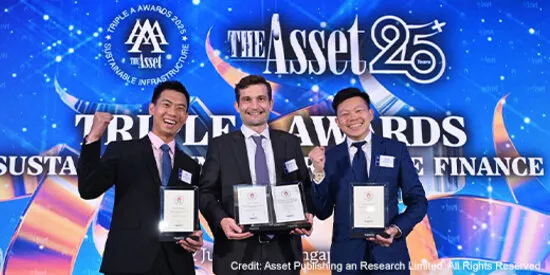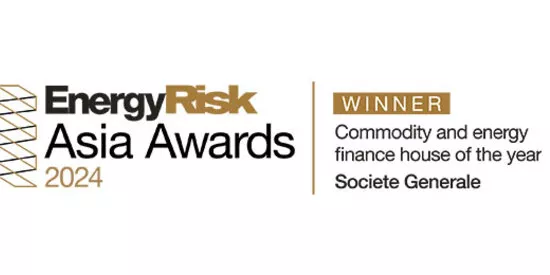
Disclosure and decarbonisation: why climate-related risks reporting matters
In light of the acceleration of climate change, the financial services industry has a crucial role to play in addressing the climate crisis and financing the transition to a low-carbon economy.
By Paul Grimal, E&S Risk Management, Corporate Social Responsibility, Societe Generale and Adam Vuaran, Head of Corporate Social Responsibility APAC, Societe Generale
Addressing climate risks can help ensure financial stability – a goal that is shared by bankers and regulators alike, and high-quality disclosure about climate risks is a key factor in mitigating such risks. To this end, the Financial Stability Board (FSB) – the international body that keeps watch over the global financial system – established the Task Force on Climate-related Financial Disclosures (TCFD) to improve the reporting of climate-related disclosures, which released climate-related financial disclosure recommendations in 2017 (the TCFD Framework).
Today, the TCFD Framework is recognised by policymakers, regulators, CEOs and institutional investors as critical to creating the transparency about climate risks required for the world to have a chance of reaching the long-term goal set out in the Paris Agreement1 to limit global warming to well-below 2 degrees Celsius above pre-industrial times; and to pursue efforts to limit such increase to 1.5 degrees Celsius.2
Societe Generale has committed since 2015 to align our activities to a trajectory limiting global warming to under 2°C. To further strengthen our position as a leader in the ecological transition, Societe Generale has recently joined the UNEP-FI Net-Zero Banking Alliance as a founding member. This commitment aligns our investment and lending portfolios on trajectories to be carbon neutral by 2050 and to limit global warming to 1.5°C.
In 2019, we signed the Green Investment Principles (GIP) in China, which comprises seven principles for green investment that covers strategy, operations and innovation. In May 2021, Societe Generale was honoured to be invited by the GIP Secretariat to share our insights on best practices in reporting and disclosure under the TCFD Framework with fellow GIP members.
Meeting the challenge
In 2017, the TCFD outlined its influential recommendations for climate-related disclosures. It noted the challenges faced by issuers that have an obligation under law to disclose material information but previously lacked a coherent framework for doing so. It aimed to meet the needs of investors, lenders and insurers for comprehensive information that allows them to make informed capital allocation decisions which can support the transition to a carbon-neutral economy.
The task force developed four recommendations on climate-related financial disclosures that are applicable to organizations across sectors and jurisdictions. Following this guidance, Societe Generale has implemented a risk management framework, developed key performance indicators and ensured the governance strategy addresses the financial impact of environmental risks. Although writing and producing the reporting is relatively simple, it requires data transparency and granular information from various departments in the bank.
In line with this implementation, Societe Generale published its annual dedicated Climate Disclosure Report3, which disclosed the Bank’s commitments, achievements and climate risk management practices based on the recommendations of the TCFD and the EU Non-Financial Reporting Directive (NFRD). We were one of the first banks to do report under both frameworks in the world. The report was recognised by the French regulator AMF (L'Autorité des Marchés Financiers) in its market review of French banks’ reporting.
Best practices in TCFD reporting
How is Societe Generale implementing the TCFD itself?
It starts with climate change being a strategic priority. In 2017, Societe Generale launched its Transform-to-Grow strategy, based on five key objectives for all Group activities. These included its corporate and social responsibility (CSR) goals, of which climate change is a key pillar.
The TCFD encourages forward-looking information through scenario analysis, a useful tool for considering and enhancing the resiliency and flexibility of strategic plans. Many investors are interested in understanding how resilience strategies are used to manage climate-related risk.
Scenario Analysis
Scenarios are a means of exploring a series of plausible future states if certain trends continue or if certain conditions are met. They provide a coherent framework for formalizing the reasoning of possible scenarios.
Societe Generale refers to the International Energy Agency (IEA) Net Zero by 2050 (NZE) Scenario when assessing transition risk and portfolio alignment. This scenario detailed how the corporates and people’s behavior should be changed to bring global energy-related carbon dioxide emissions to net zero by 2050 and give the world an even chance of limiting the global temperature rise to 1.5 °C. It also demands unparalleled changes across all parts of the energy sector.
The future for climate-related risks disclosure
The TCFD Framework is specifically focused on climate-related risk management and provides green standards, metrics and climate targets. This creates opportunities as well as challenges. On the risks side of the equation, there are transition and physical risks to take into account, including policy and legal risks, market, reputational risks as well as the physical risks from extreme weather events and rising mean temperatures and sea levels. In terms of opportunities, the categories identified by the Task Force include resource efficiency, energy sources, products and services, markets and resilience.
Societe Generale supports the TCFD recommendations and applies them as a reporting framework. We believe they are an important contributing factor to implementing the energy transition in the financial sector and in the economy as a whole. Since 2017, significant advancements have taken place in the areas of climate risk assessment and disclosure. These changes have included greater knowledge and awareness by financial actors, increased regulatory requirements for disclosure, and new tools and scenarios for conducting climate assessments.
The pace of climate-related disclosures in the banking sector has clearly increased. Widespread high-quality climate related disclosures will highlight which banks are making progress, relatively speaking, and in so doing. It will provide investors and stakeholders with valuable insights for decision-making. Furthermore, as more regulators globally get involved and set expectations on climate-related disclosures for all sectors, including the banking sector, the TCFD Framework will likely continue to play an important role as the leading climate-related risks disclosure framework for banks.
1 The Paris Agreement refers to the agreement made on climate change mitigation, adaptation and finance at the Climate Change Conference in Paris (COP21) of 2015, and ratified in 2016 by almost all countries in the world.
2 https://www.societegenerale.com/en/news/press-release/societe-generale-joins-net-zero-banking-alliance
3 https://www.societegenerale.com/sites/default/files/documents/2020-12/societe-generale-climate-disclosure-report.pdf

Outlook for Global Markets and Japan-US Monetary Policy
Jin Kenzaki, Head of Japan Research and Chief Japan Economist, and Tsutomu Saito, Multi Asset Strategist recently shared...

Jerome Niddam named Chief Executive Officer for Societe Generale Asia Pacific
Societe Generale announces the appointment of Jerome Niddam as Chief Executive Officer for Societe Generale Asia...

The Asset Triple A Sustainable Infrastructure Awards 2025
Societe Generale has been recognised as the “Asia Pacific ESG Project Finance House of the Year”, “Australia Project...

Asia economic and investment outlook for second half of 2025
Where is Asia headed in the second half of this year?



